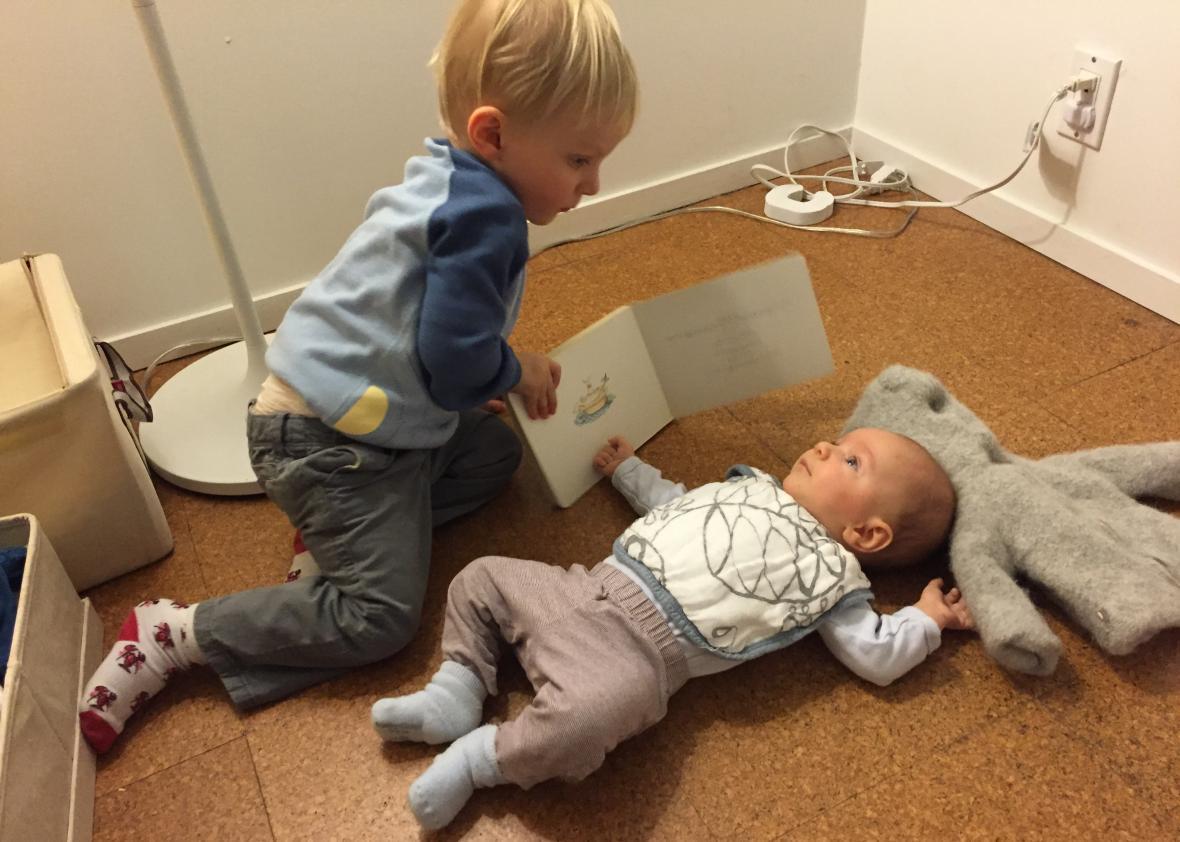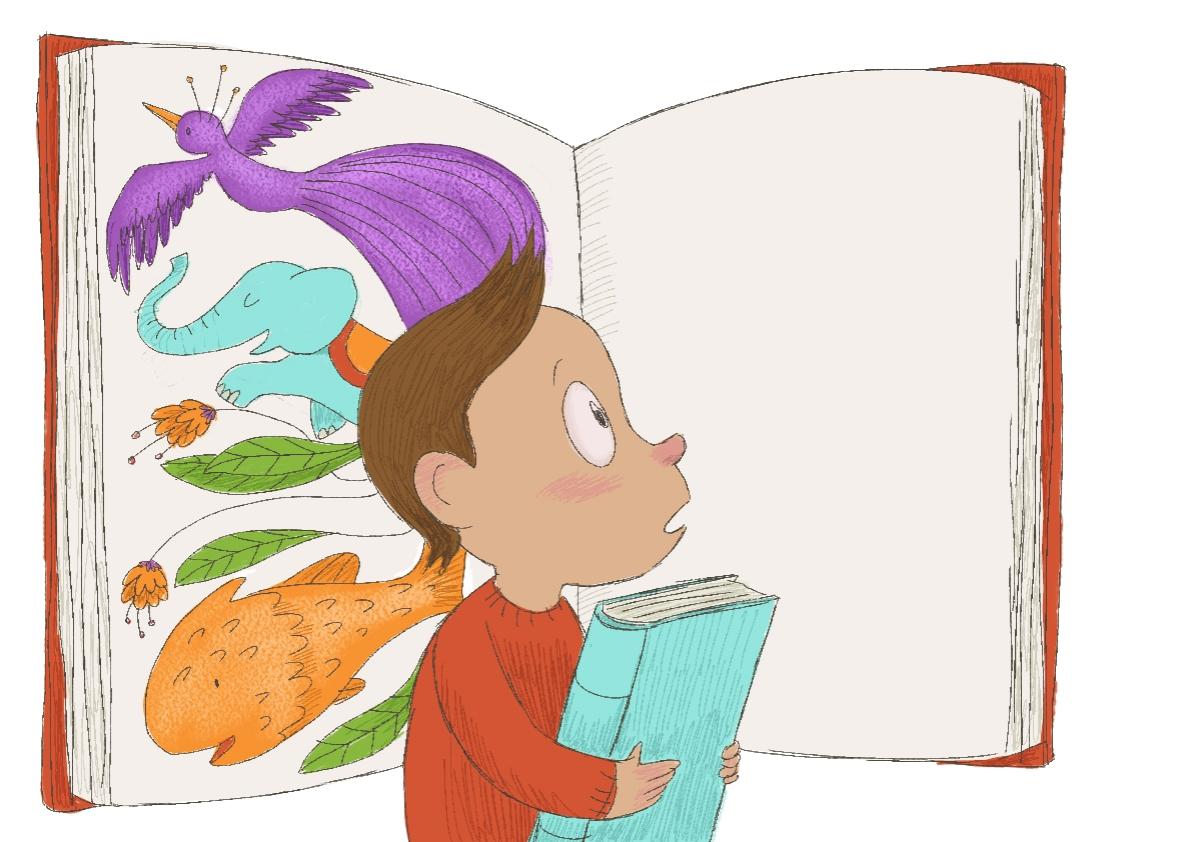Nightlight is Slate’s pop-up blog about children’s books, running for the month of August. Read about it here.
My child’s room is separated from the kitchen by sliding doors. There’s a glass panel that looks out over the living room in lieu of a window. It’s about 10 feet by 10 feet, and that’s a generous estimate of its dimensions. But despite its modest square footage and nonexistent natural light—“kids don’t need light; they’re not plants,” my husband joked when we first moved in—it’s also a very special place. Because along with the bed and dresser and not much else, it’s where we keep the books. Each night, after bath time, before the march of the stuffed animals from one end of the bed to the other (I don’t know how this started, but it’s become a thing), my kid—I’ll call him M—and my husband or I sit on the floor and we read. M, who is almost 3 years old, turns the pages, and I say the words, sometimes telling him to slow down or speed up. I’m chatty and conversational on a good night, rushing through it on the nights (too many) when there’s other stuff to do. M focuses and points and more often than not seems thoroughly absorbed, although, for most of the hundreds of times we’ve gone through this evening routine, he remains entirely silent.
When M was about 6 months old, he was lying on his stomach on the floor when the dog came over and gave him a nudge. He rolled onto his back. This was about the time that our pediatrician and baby books had informed us that this particular maneuver should be taking place. “Teamwork!” my husband exclaimed with a look of delight on his face. I caught the whole thing on my phone and it’s one of my favorite videos from M’s earliest months—a reminder that we, dog included, were doing OK, that one way or another things would probably work out.
But around the time M was 18 months old, my husband, who is far more on top of the “when” and “what” of child development than I am, started reminding us of a milestone that M clearly was not surpassing: He should have a few words, and he should be using them in a way that other people could understand. Forget using them correctly; he didn’t have any words at all.
My husband began to lobby for assessments by specialist doctors or speech therapists, which I deemed ridiculous—he wasn’t even 2! His hearing was fine, and his ability to follow what we were saying seemed to increase by the day. But my husband was tenacious (I called it “paranoid” at the time), and eventually we signed M up at a nearby private speech pathology practice. I sat in on one of sessions, in which M was placed behind a pint-sized plastic desk and a therapist tried to get him to ask for toys that she dangled just beyond his grasp. I get that toddlers have pretty basic motivations, but this seemed to bore even him. It didn’t instill confidence that this was a necessary and useful measure to be taking.
At the time, I felt justified: I told myself that there were plenty of late talkers who’d only had a few sounds at his age and went on to develop at a pediatrician-approved clip. And everyone to whom we expressed some degree of concern had a story about their cousin or neighbor or nephew—Einstein, don’t you know!—who didn’t speak until they were 3 or even 4 and then spoke in complete and charmingly precise sentences. (“I’d like another donut please,” was the first sentence of one such child that was relayed to me secondhand; “Daddy, I dislike this breakfast you always prepare,” was another.) I figured my son was just saving up for some epic soliloquy on his dietary preferences when we least expected it. And I didn’t know any adult who couldn’t talk. I figured it would eventually happen.
If I’m honest with myself, there was denial in my reluctance to deem M’s delay a problem. It was exceedingly difficult for me to accept that my child—writer offspring!—didn’t have a way with words. It was much easier to believe that he was just a sensitive type who was so busy processing what was going on in his head that he didn’t care to make it known yet to the rest of us.
But when M hit 2 and still didn’t have a single word or even more than a handful of sounds in his repertoire, I began to accept that this might actually be an issue. We signed him up for an Early Intervention assessment: the first step in qualifying for a government program that is, as the name implies, designed to catch and address developmental issues at an early age. A social worker and a speech pathologist visited the house, and asked us all kinds of questions ranging from how our child was born to what he last ate as a snack. How is he at chewing carrots, the speech pathologist asked. My husband and I looked at each other furtively. Had we ever even tried raw carrots with him? Was this the first stage of a rude awakening in which we’d realize all the ways in which we’d already, ignorantly failed?
Before we knew it, we had a suspected diagnosis—childhood apraxia of speech, though they wouldn’t be able to officially diagnose him later—and a treatment plan: therapy sessions in our home a few times a week. The cost of M’s private treatment had been a source of stress, so it was a relief to qualify for this state-subsidized therapy. Less comforting, at least to me, was the label we’d now affixed to our child. The label made it real—something for which there were discussion forums to be searched, experts to be consulted, and unpleasant conclusions to be reached. I cracked one book on the disorder, in which one of the first sections was titled something like “Yes, Your Child Has Special Needs,” felt a sinking in my stomach, and never wanted to open it again.
Childhood apraxia is a disorder in which the brain doesn’t properly “speak” to the mouth. The kid has an understanding of language, but there’s a disjunction between what the head can comprehend and what the mouth is capable of doing due to some somewhat mysterious neurological misfiring. There’s not a ton of uniformity in the way that cases present themselves, but it can result in developmental delays that take years to resolve.
Kids with apraxia often display frustration over their limited abilities, but in M’s case, he wasn’t even really trying to obtain the fundamentals of spoken language. He’d figured out a means to make himself understood through facial expressions, gestures, and normal-seeming toddler demonstrations of disgust or delight. While this ability to communicate without words seemed to diminish his motivation to speak, it was also reassuring: All that talking, singing, limiting of screen-time, and, especially, reading that we’d done had, ostensibly, had an impact. The words were in there, even if they weren’t coming out.
You read to your child because the experts say it’s important. You read to your child because the hours of parenting are endless and it’s something to do. Maybe you read to your kid because you love it, and you make your living from it, and you can’t imagine having a child who doesn’t appreciate your subsistence, in the fullest sense of the word. It’s an exercise in parental narcissism—an effort to shape your child according to your own proclivities and predilections—but also one of hope: an attempt to bequeath a form of solace and communion that will last them the entirety of their lives.
But if you’ve got a kid who doesn’t speak, the exercise feels doubly invested with necessity. In the months that followed the diagnosis, it was reading, more than the occasional new sound M produced, that became my primary comfort, my means of believing that one way or another, things would probably work out. (The dog couldn’t help this time.) M was clearly taking it all in, so we read and read, offering a stream of words that were never repeated back to us, but hopefully had some resonance. These fingers-crossed, Hail Mary moments of parenting happen all the time, but even more than usual, this felt like a prayer delivered in the dark.
Fortunately for us, the months following the diagnosis corresponded with a time when M developed interests beyond the plodding, plot-less, Pat-the-Bunny-genre of book, and entered slightly more dynamic territory. We still loved Goodnight Moon, but now Little Fur Family was part of the regular repertoire. We still had Spot’s First Walk, but now The Gruffalo introduced more wily ways. We still had fifteen books about trucks and trains, but now we also had The Polar Express. With limited feedback, we couldn’t be sure that these new stories were widening his world, but we kept up our attempt.
We had a second child recently, and we are already seeing the differences between the brothers. The younger one is a better eater. He coos and babbles and makes himself heard in a way that M never did. This is what we missed, my husband and I sometimes tell each other—a warning sign about which we could have done precisely nothing except panic a few months earlier. There are two years between them, but it feels almost as if the younger will be teaching sounds to the older.
There is one thing that I feel confident the older will show the younger, though. The other day I put the baby on the floor and walked off to tend to something in the other room. When I returned, I saw that M had gathered up some picture books and was sitting next to his brother, patiently turning the pages, and showing him a whole world that is waiting for him.

Chloe Schama
